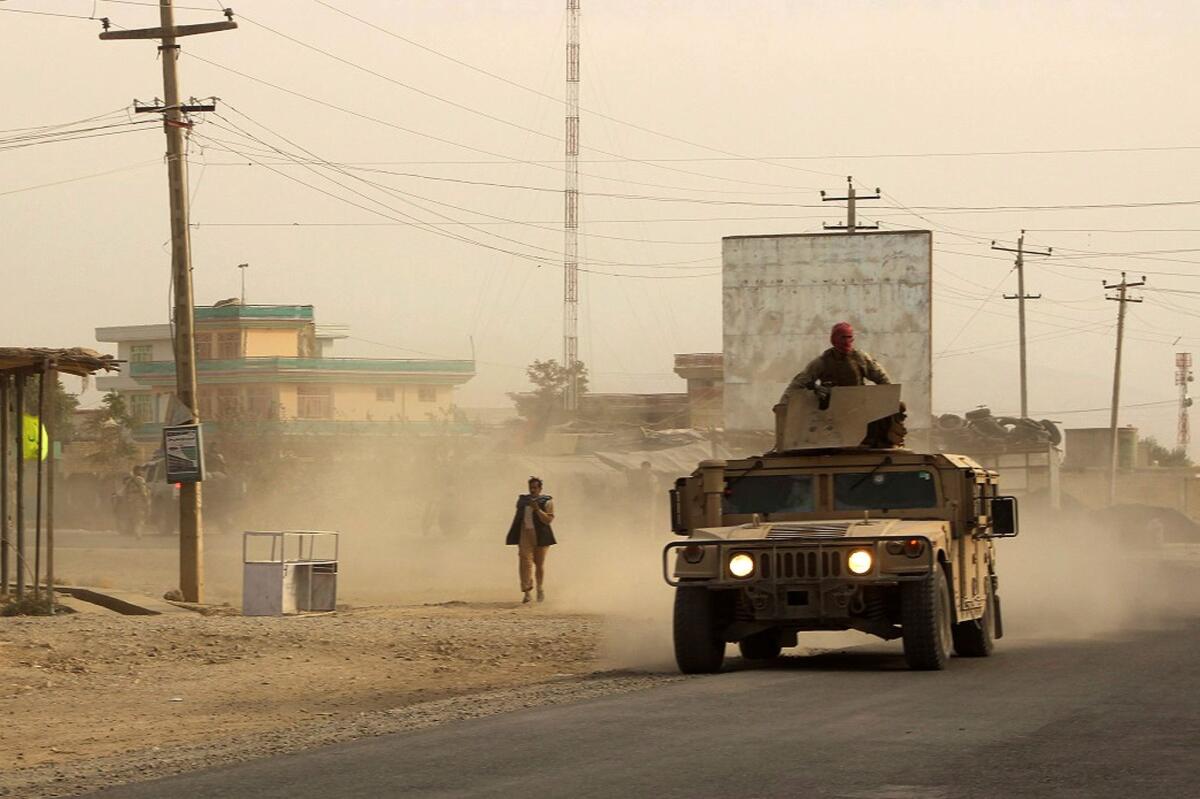Taliban seizes parts of key Afghan city of Kunduz in deadly fighting

Afghan security forces travel in a Humvee on Monday as fighting continues between Taliban militants and government forces in Kunduz, capital of Kunduz province.
- Share via
reporting from Kabul, Afghanistan — Taliban fighters entered the capital of northern Afghanistan’s Kunduz province on Monday, raising their flag over portions of the city and engaging in fierce fighting with Afghan security forces, according to residents and government officials.
Sources in the provincial capital said the clashes began in the early morning when militants entered the city from four directions. Mahboobullah Mahboob, a member of a local council, said he and his family fled the city, also called Kunduz, shortly after 6 a.m. when fighters neared their neighborhood.
“The entire city is under lockdown,” said Alhaj Aminullah Nabizada, who is active in a local political party. The city’s approximately 300,000 residents were living in fear, he said.
The aid group Doctors Without Borders said its hospital in Kunduz had received eight bodies and 102 people who were wounded, 36 of them critically.
It was unclear how many others may have been injured or killed. Local officials said one doctor was killed, but did not specify where.
In online statements, the Taliban claimed to have entered the city’s 200-bed main hospital to look for the “injured enemy,” an apparent reference to Afghan soldiers and police. The claim could not be verified, and there were no immediate reports of violence at the hospital.
The Taliban has not taken over a provincial capital in the nearly 14 years since its ouster from power by the U.S.-led military invasion. That makes Kunduz, Afghanistan’s fifth-largest city, symbolically important; the province has been a focal point of the group’s recent military offensive.
A media watchdog group reported that Roshan, a female-run TV and radio service, had been set on fire by the militants.
“Everyone is saying the security forces aren’t putting up enough of a fight and that if reinforcements don’t arrive soon, the city will fall to the Taliban,” Nabizada said.
At a news conference in Kabul, the Afghan capital, Interior Ministry spokesman Sediq Sediqqi insisted that the government would reclaim control of Kunduz.
“Count on our soldiers. They will soon clear the city,” he said.
Sediqqi said there were international terrorists in Kunduz, an apparent reference to the Islamic Movement of Uzbekistan, an Al Qaeda-linked group known to fight alongside the Taliban.
At a separate evening news conference in Kabul, Gen. Murad Ali Murad, the ground forces commander, said Taliban fighters had taken refuge in residential areas, including in homes. The civilian presence kept the military from staging air attacks, he said, but he expressed optimism that his ground troops could prevail.
The Taliban claimed it was taking precautions to limit civilian casualties. A Twitter account affiliated with the group urged “all citizens of Kunduz city to remain inside their homes throughout the fighting to avoid harm.”
Dominic Medley, a spokesman for the United Nations Assistance Mission in Afghanistan, said its staff in Kunduz had been relocated.
The Taliban assault came on the eve of the first anniversary of President Ashraf Ghani’s inauguration and renewed concern about his government’s ability to quell the insurgency.
It also provided an opening for critics of President Obama’s Afghanistan policy. Sen. John McCain (R-Ariz.) issued a statement criticizing the U.S. drawdown of forces in Afghanistan and saying the Kunduz attack “is the latest manifestation of this dangerous reversal.”
Latifi is a special correspondent. Times staff writer W. J. Hennigan in Washington contributed to this report.
More to Read
Sign up for Essential California
The most important California stories and recommendations in your inbox every morning.
You may occasionally receive promotional content from the Los Angeles Times.













